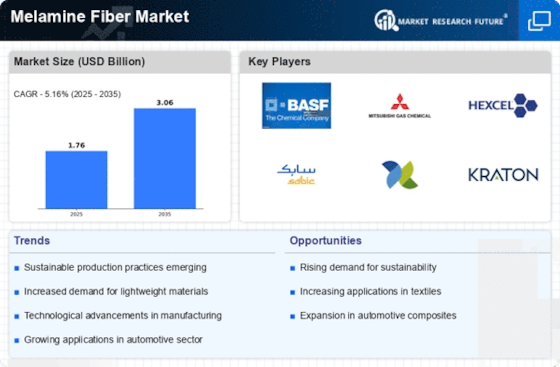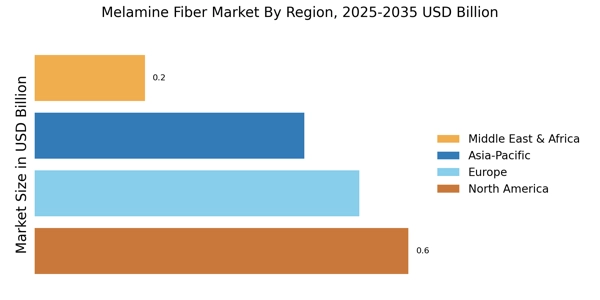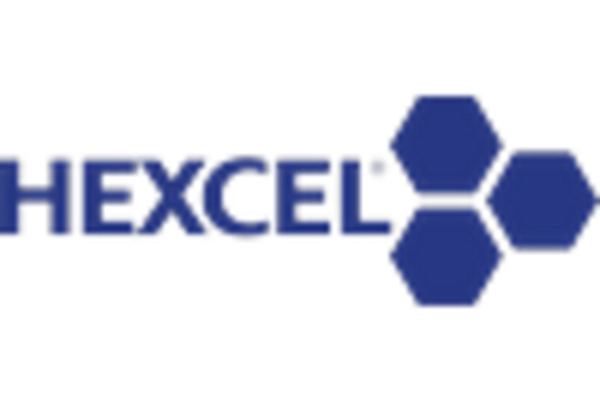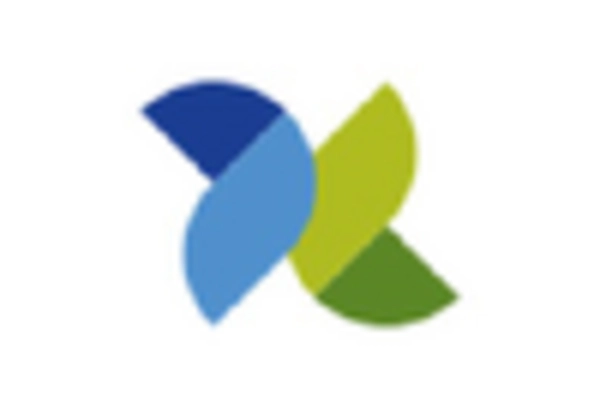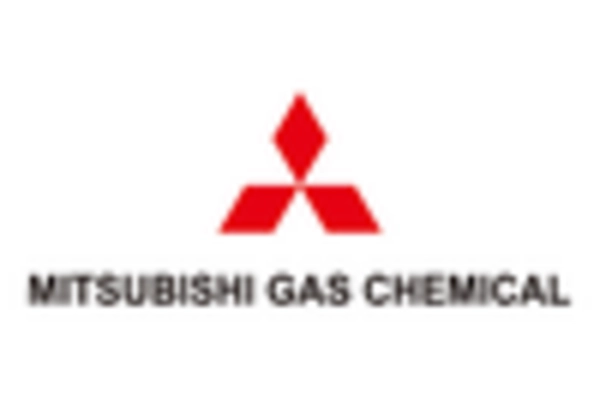Technological Innovations in Production
Technological advancements in the production processes of melamine fiber are significantly impacting the Melamine Fiber Market. Innovations such as improved polymerization techniques and enhanced spinning methods are leading to higher quality fibers with better performance characteristics. These advancements not only increase production efficiency but also reduce waste, aligning with the industry's sustainability goals. The introduction of automated systems and smart manufacturing practices is expected to further streamline operations, potentially lowering costs and increasing output. As a result, manufacturers are better positioned to meet the rising demand for high-performance melamine fibers across various applications, including textiles and composites. This technological evolution is likely to play a crucial role in shaping the future landscape of the Melamine Fiber Market.
Rising Demand for Eco-Friendly Materials
The increasing emphasis on sustainability is driving the Melamine Fiber Market. As consumers and manufacturers alike seek eco-friendly alternatives, melamine fiber, known for its durability and low environmental impact, is gaining traction. The market is projected to witness a compound annual growth rate of approximately 5% over the next few years, reflecting a growing preference for sustainable materials. This shift is not merely a trend but appears to be a fundamental change in consumer behavior, influencing purchasing decisions across various sectors. Industries such as textiles and automotive are particularly focused on integrating sustainable materials, thereby propelling the demand for melamine fiber. As regulations tighten around environmental standards, the Melamine Fiber Market is likely to benefit from this shift towards greener solutions.
Expanding Applications in Various Industries
The versatility of melamine fiber is driving its adoption across a multitude of industries, thereby enhancing the Melamine Fiber Market. From textiles to automotive and construction, the fiber's unique properties, such as heat resistance and flame retardancy, make it suitable for diverse applications. For instance, in the automotive sector, melamine fibers are increasingly used in interior components due to their lightweight and durable nature. The market is expected to expand as new applications are discovered, particularly in the realm of advanced composites and insulation materials. This broadening scope of use suggests that the Melamine Fiber Market is not only resilient but also poised for growth as industries continue to innovate and seek out high-performance materials.
Growing Awareness of Fire Safety Regulations
The increasing awareness of fire safety regulations is influencing the Melamine Fiber Market. As industries face stricter compliance requirements, the demand for flame-retardant materials, such as melamine fiber, is on the rise. This trend is particularly evident in sectors like construction and textiles, where safety standards are paramount. The market is likely to experience growth as manufacturers respond to these regulatory pressures by incorporating melamine fibers into their products. Additionally, the emphasis on safety is prompting companies to invest in materials that not only meet but exceed regulatory standards. This heightened focus on fire safety is expected to drive innovation within the Melamine Fiber Market, leading to the development of new, enhanced products that cater to safety-conscious consumers.
Increased Investment in Research and Development
Investment in research and development is a key driver for the Melamine Fiber Market. Companies are allocating significant resources to explore new formulations and applications of melamine fibers, aiming to enhance their properties and expand their market reach. This focus on R&D is likely to yield innovative products that meet the evolving needs of various sectors, including construction, textiles, and automotive. As competition intensifies, firms that prioritize R&D may gain a competitive edge, leading to the introduction of superior melamine fiber products. Furthermore, collaborations between industry players and research institutions are expected to foster advancements in fiber technology, thereby propelling the Melamine Fiber Market forward. The potential for breakthroughs in material science could redefine the applications and performance of melamine fibers.


